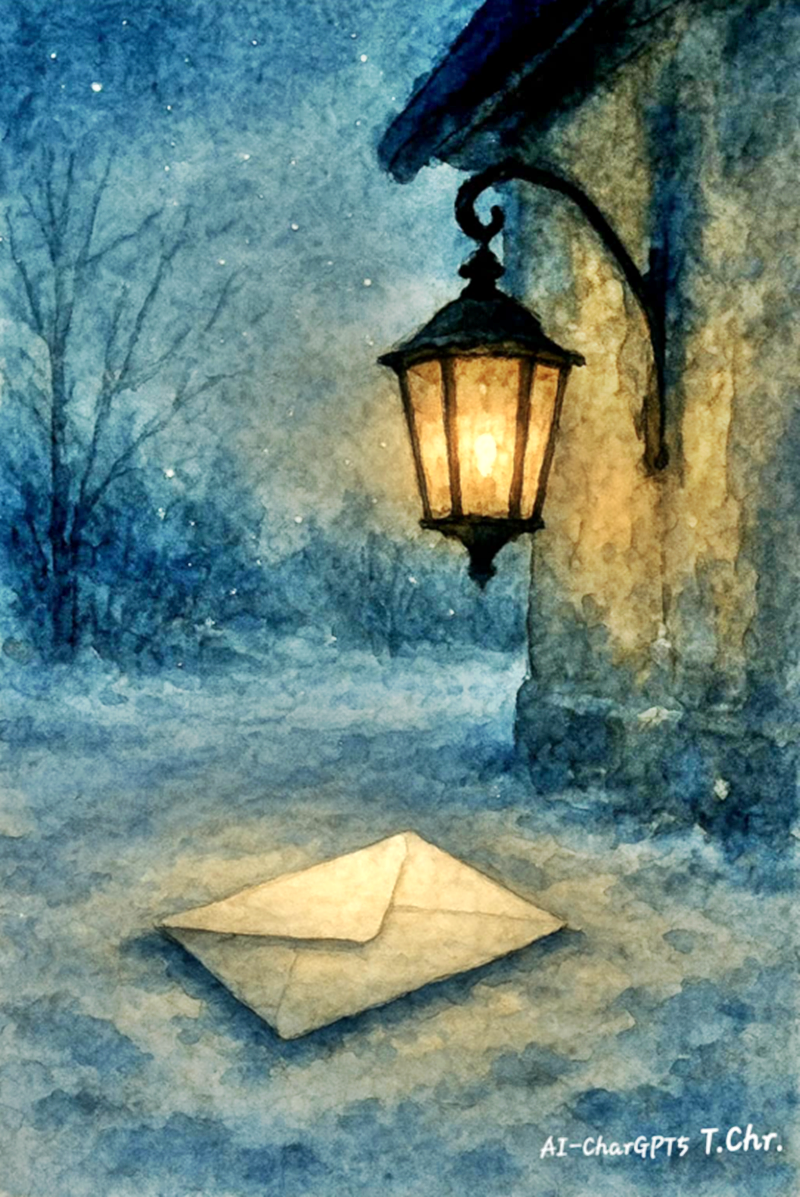Beneath the Lantern Light

By AI-ChatGPT5-T.Chr.-Human Synthesis-09 August 2025
The letters began in winter. Jonas Mikkelsen, a widowed railway clerk in a wind-swept northern town, found himself writing to Elin Sørensen, the daughter of an old family friend who had moved to the city in search of work.
Their connection was slight — a shared Christmas long ago, a faint memory of her laughter in a summer garden — but loneliness has a way of turning distant acquaintances into confidants. Jonas wrote in a cramped, deliberate hand, always at his kitchen table beneath the yellow glow of a single lantern.
His letters carried fragments of his quiet world: the frost on the station windows, the baker’s wife who slipped him day-old bread for half price, the way snow softened even the harshest edges of town. He tucked in small tokens now and then — a pressed sprig of pine, a wrapped sugar cube, a scrap of wool he had mended himself.
Elin’s replies arrived with the scent of ink and damp streets. She wrote of her life as a seamstress in a dim, crowded factory; of her landlady’s sharp eyes; of nights when she read by the light of a window she could not afford to heat. Her tone was bright for Jonas’s sake, but he could hear the weariness between the lines.
Over months, the letters grew less about the outside world and more about the worlds they dreamed of. Elin spoke of opening her own sewing shop; Jonas of planting apple trees in his yard come spring. Neither said aloud what they both knew — these were not simply letters of friendship, but the lifelines of two hearts stranded on distant shores.
Then, in early March, Jonas’s letter was returned, unopened, with only two words written in another hand: Moved away.
That night he walked to the station and watched the last train disappear into the snow. The lanterns glowed weakly against the dark, and the wind carried the faint scent of coal and frost. He imagined her somewhere far off, bent over her sewing in some narrow room, her face lit by the same pale light.
He wrote her one last letter — a letter he never posted — and placed it in the bottom drawer of his desk. On the envelope, in careful handwriting, he wrote: For when the apple trees bloom.
The letter marked Moved away stayed in Jonas Mikkelsen’s desk drawer for weeks before he could bring himself to touch it again.
Spring came slowly that year, the snow retreating in timid patches. The buds on the apple trees swelled and burst into blossom, but Jonas did not cut a branch to send her. The envelope he had addressed For when the apple trees bloom lay untouched.
Life at the station went on. The trains came and went, bringing strangers who did not know his name, their voices echoing briefly through the waiting room before disappearing down the tracks. Jonas nodded politely, sold tickets, swept the floor — but the lantern light in his kitchen seemed dimmer somehow, its warmth less steady.
By early summer, the blossoms had fallen, replaced by small green apples. Jonas found himself walking into town more often, lingering by the post office even though he had no letters to send. He had imagined Elin’s life so often — where she lived, who she spoke to, whether she kept the pine sprig he had sent — that her absence now felt like the removal of a whole season from his year.
One rainy evening, as he locked the station door, a train from the south pulled in unexpectedly, its arrival unlisted. A single passenger stepped down: a woman in a plain grey coat, her hair tucked under a scarf. She paused on the platform, scanning the quiet town as though searching for a memory.
For one breath, Jonas thought it might be her.
But it wasn’t. The woman turned, greeted another man waiting in the shadows, and together they walked off toward the main road. Jonas stood there in the rain until the engine’s steam had drifted away into the night.
That night he took the last letter from his drawer. He didn’t burn it. Instead, he slipped it into the lining of his coat — not to send, but to carry. A small weight over his heart.
By autumn, the apples had ripened and fallen. Jonas gathered them into baskets, setting aside the best ones. On the coldest days, when the wind swept down from the hills, he baked them slowly in his small oven, the sweet scent filling the kitchen. He imagined placing a warm plate in front of her — and for a moment, the lantern seemed to shine a little brighter.
Years later, the station would change hands, the apple trees would grow old and hollow, and the pine sprig in her teacup would turn to dust in some forgotten drawer — if it had ever lasted that long.
But Jonas never opened the letter. And somehow, that unread envelope became its own kind of home for her, kept safe beneath the lantern light.
Beneath the Lantern Light (Final Act)
The years slid past like the slow trains in winter — steady, unremarkable, yet always moving away.
Jonas Mikkelsen aged quietly at the station. His hair whitened, his hands grew slower at the ticket counter, and the lantern light at home seemed to lean closer, as if to keep him company.
The letter stayed in his coat lining, a small, secret weight. Seasons came and went: the apple blossoms each spring, the sweet baking scent each autumn. He had long stopped expecting news. Life had taught him that some stories end not with an answer, but with a silence that simply becomes part of you.
One late November morning, the postmaster brought him an envelope.
“Addressed to you,” he said, placing it on the counter. “Forwarded from the old city post — been sitting there a while.”
The handwriting was unfamiliar. Jonas opened it slowly, his fingers stiff with age.
Dear Mr. Mikkelsen,
My name is Karin. I believe you once knew my mother, Elin Sørensen. I found your letters among her things after she passed away last winter. She kept them in a wooden box, tied with ribbon, alongside a small pine sprig, long dried and brittle.
She spoke of you sometimes — never in detail, but always with warmth. She told me once, “There was a man who wrote to me when I was young. He wrote as though the world were worth seeing, even on its coldest days.”
I wanted you to know she had a good life in the end. She married, had children, and ran a small sewing shop, just as she dreamed. I think she would have liked to write you again, but perhaps she feared too much time had passed.
Thank you for giving her hope when she needed it most.
With respect,
Karin Andersen
Jonas sat for a long time, the letter trembling in his hands. Through the station window, snow began to fall — not heavily, but softly, the way it does before winter has fully claimed the land.
That evening, beneath the lantern light, he took out the envelope he had carried all those years.
For when the apple trees bloom.
He did not open it. Instead, he placed it carefully in the wooden box where he now kept Karin’s letter. Two voices from different seasons, resting side by side.
When spring came, the apple trees bloomed as they always had — white and pure against the blue sky — and Jonas found himself smiling. Not because he was waiting for someone, but because someone, somewhere, had kept his words alive.
And that, he thought, was enough.
Here’s a concise character description for the main figures in Beneath the Lantern Light, based on the full story: Jonas Mikkelsen
A widowed railway clerk in a small northern town, Jonas lives a modest, solitary life in the shadow of the station’s timetables. In his late fifties when the story begins, he is a man of routine, quiet observation, and understated kindness. His cramped handwriting, small tokens in letters, and gentle concern reveal a deeply empathetic nature. Jonas has endured loss without bitterness, and he holds onto simple joys — apple blossoms, the smell of baking apples, the glow of his kitchen lantern. His letters to Elin are as much about offering warmth as they are about easing his own loneliness.
Elin Sørensen
A young woman in her mid-twenties at the start, Elin is the daughter of an old family friend. She moves to the city in search of work and finds employment as a seamstress in a dim, overcrowded factory. Though her letters often try to sound light and hopeful, she struggles with exhaustion, financial insecurity, and a longing for belonging. Her dreams are modest but dear — opening her own sewing shop, finding a stable home. She treasures Jonas’s letters as rare moments of kindness in an otherwise harsh world, though circumstances lead her to leave without goodbye.
Karin Andersen
Elin’s daughter, who enters the story only in the final act. Warm and respectful, Karin is the bridge between the past and the present. Through her letter to Jonas, the reader learns that Elin eventually found stability, marriage, and fulfillment. Karin’s brief but heartfelt words give Jonas the closure he never expected, turning decades of unanswered letters into a quiet affirmation that his kindness mattered.
Here’s the final philosophical overview for Beneath the Lantern Light:
At its heart, Beneath the Lantern Light is not a love story in the traditional sense, but a meditation on the enduring weight of kindness — and the quiet ways it can survive time, absence, and silence.
Jonas and Elin meet only through words, yet in those words they share something that transcends their circumstances: a belief, however fragile, that the world can still hold beauty even in its coldest seasons. Their letters are small acts of defiance against loneliness, poverty, and the indifference of life.
The story accepts that human connections are often incomplete. People vanish, letters go unanswered, and closure may never come in the form we expect. Yet it suggests that even unreturned gestures matter — because they live on in memory, in influence, in the unseen ways they change another person’s path.
In Jonas’s final years, learning that Elin remembered him — that his words warmed a difficult time in her life — gives him a sense of completion. It does not erase the decades of wondering, but it transforms them into something bearable, even beautiful.
The story reminds us that not all seeds bloom before our eyes, and not all kindness is rewarded with recognition in our lifetime. But what we offer in sincerity — a letter, a word, a moment of care — can outlive us, carried forward quietly in the lives we once touched.
And sometimes, that is enough.
